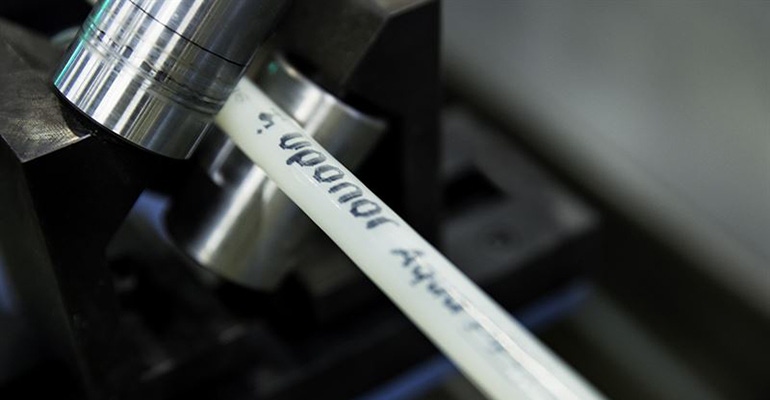Hard-to-Recycle PEX Pipes Get New Lease on Life via Chemical Recycling
Partnership achieves first production of cross-linked polyethylene (PEX) pipes based on feedstock from chemically recycled PEX waste.
February 14, 2023

The properties of cross-linked polyethylene (PEX) pipes — robustness, temperature resistance, and longevity — make them a popular choice in the buiilding and construction sector for energy-efficient heating and safe plumbing. The material's interconnected polymer chains, however, make PEX nearly impossible to recycle by conventional methods. Enter chemical recycling. A partnership of four companies has succeeded in the successful production of new pipes based on feedstock from chemically recycled post-industrial waste plastic from PEX pipe production. The companies believe it is the first time PEX has been chemically recycled, demonstrating that the process can close the circularity loop for hard-to-recycle waste plastic.
The cooperation sees Finland-based Wastewise use its pyrolysis-based chemical recycling technology to liquefy industrial waste from Uponor’s PEX pipe production, breaking down the polymers back into their building blocks. The resulting oil-like recycled intermediate is then co-processed in Neste’s oil refinery in Porvoo, Finland, and upgraded into recycled Neste RE, a high-quality drop-in feedstock for the production of new polymers. Austria-based Borealis feeds this raw material into its steam cracker and polymerizes it into polyethylene as part of its Borcycle C chemical recycling portfolio. Closing the circle, Uponor uses the polyethylene to create new PEX pipe systems for heating, plumbing, and cooling applications. The pipes are even suitable for sensitive applications with high requirements, such as drinking water systems, according to Uponor. The whole value chain is traceable via an ISCC PLUS–certified mass balance approach.
“We are very excited about this collaboration as it gives us a head start on our transition to circular materials,” said Thomas Fuhr, chief technology officer at Uponor. “PEX is by far the material that has the most versatile application uses, from building water-supply systems to efficient radiant heating and cooling systems, thanks to its superior properties for the construction industry. At Uponor we have just celebrated the first 50 years of our PEX piping, and now our new long-term goal is to use 100% of our PEX waste as raw material through closed-loop recycling.”
Borealis said that it is able to integrate the chemically recycled PEX pipe waste plastic into its established manufacturing processes. A drop-in solution, it doesn’t require additional tests, approvals, or validation.
Approximately 80% of PEX production waste enters the circular economy through this process, and the pyrolysis oil reportedly is of sufficient quality for use as input for a refinery that can process it into a high-quality cracker feed.
Although it will take some time to reach large-scale operations, this project is providing the blueprint for circular value chains for polymers via chemically recycling, said Neste’s Mercedes Alonso, executive vice president, Renewable Polymers and Chemicals. “It’s pushing the technology from the promise to the delivery phase. Further, it shows the importance of bringing the right partners together to cooperate.”
The partnership holds potential for further cooperation beyond production waste, added the news release. The PEX pipes made by Uponor have already been optimized from a resource efficiency point of view through reduced wall thickness and increased lifetime. At the end of their long life cycle, mechanical recycling can be an option, but it results in downcycling the materials into other applications. Through the use of chemical recycling, however, the PEX waste pipes can be reincarnated as fully functional new PEX pipes. Moving forward, the partners will evaluate further opportunities for cooperation. Aside from broadening the waste material pool, this may also include higher recycled volumes.
About the Author(s)
You May Also Like




